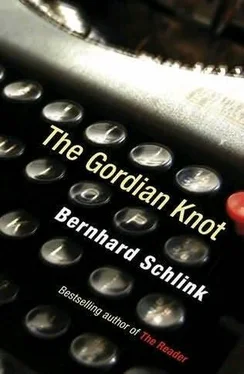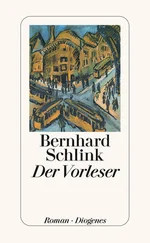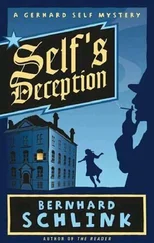Late in the afternoon of the following day Georg saw the young man again. He had been looking through old telephone directories for a bona fide Kramsky, perhaps a friend, a relative, or even a former coworker whose name Françoise might have borrowed. He hadn’t found anything. At five o’clock he had left the New York Public Library on Forty-second Street and walked uptown. Where should he look next? The theater workshops at the cathedral changed every year, but perhaps some of the participants signed up several years in a row. He could ask the members of the current workshop if anyone had been a member of a previous one and might know someone who had been a member of an even earlier one, who, in turn, might know someone who had… On Madison Avenue Georg eyed the expensive trifles that filled the display windows of the boutiques: flowers, paintings, jewelry, toys, antiques, expensive carpets. The women with their elegant clothes and comportment looked at him coldly, as if they were gingerly picking up some bauble, glancing at it, and casting it aside.
A bus stop sign listed a bus that went past Georg’s place. He turned to look if he could see a bus coming, and saw the redhead again. He was on the other side of the street, and turned to look at a store window. The bus arrived, but the redhead made no sign of getting on too. For as long as Georg could see him from the bus, the man was still looking into the shop windows.
People were getting on and off, people were shopping, a fire hydrant was being given a fresh coat of paint, store shutters were being repaired, a car was being unloaded, two people were embracing next to a waiting cab. Georg saw all this but didn’t take it in. It was all about winners and losers. He and those like him stood on one side: amateurs, fools, and losers; on the other side were the professionals who were part of the world of big business, international politics, organized crime, and the secret service: the world of success. Still, like anyone who reads the newspapers, he had seen enough politicians and businessmen trip and fall over their lies and blunders. But what intimidated him about the redhead’s shadowing him was how amateurishly he seemed to go about it.
The bus went up Madison Avenue and turned left. He had a hard time finding his bearings. At the next bus stop he saw on his left the bleak northern end of Central Park, and on his right a row of bricked-up, dilapidated mansions that had once been beautiful. Black children were playing in the rays of an early streetlight. A girl of about ten seemed to be putting on some kind of show: she struck poses like a star, limped like an old woman, scolded a little boy as if she were his mother, and strutted about like a macho guy putting the moves on a beautiful woman. She dropped the act, but the bus moved on and Georg couldn’t see what she did next.
WHEN GEORG OPENED THE DOOR to his apartment, he heard music, voices, and laughter. Two children were playing in the hall, and there were some people sitting in the living room, though most of the guests had crowded into the kitchen. Larry had given a lecture on Kafka in America that had been very well received, and was now throwing a party for his friends and his colleagues from the German Department.
Georg poured himself a drink and mingled with the guests. In the kitchen he heard scraps of English and German conversations, academic chitchat. A beautiful, vain woman with black hair and green stockings was leaning against the door. “How are you?” Georg asked, but she turned away and began talking to a young man in a turquoise shirt.
An amicable elderly gentleman in a purple jacket and a violet scarf asked Georg whether they had met before. They hadn’t.
A black man in a white suit asked Georg what he was doing in New York, and Georg told him he was working on a book. The black man introduced himself as a reporter for the New York Times , and said he was still waiting for his big break. One day he’d make a real splash with a big feature.
In the living room a man was telling a story to a captive audience. “Finally our lawyers came to an agreement,” he was saying. “She gets custody, and I get visiting rights every Sunday.” Everyone laughed.
“What’s so funny?” Georg whispered to a woman next to him.
“Every time I come back,” the man continued, “I’m a shadow of my former self.” Again everyone laughed, except for the man telling the story; he was spindly and of an uncertain age, with sparse curls and nervous fingers.
“That’s Max,” the woman next to Georg whispered, as if in answer to his previous question.
“And?”
She took Georg aside. “The dog… Max and his girlfriend broke up and have been fighting over who gets to keep the dog. By the way, my name is Helen. Who are you?” She looked up at him expectantly. She was short and wearing a tight skirt and a thick woolen pullover out of which peeked the collar of her blouse. She struck him as having wary eyes. He wasn’t certain whether they were defensive or unsure. She had longish, dark blond hair, and one eyebrow arched slightly higher than the other. Her mouth was set and her chin energetic.
“I’m Georg, Larry’s new roommate. Are you in the German Department too?”
She was teaching German and was working on a dissertation about German fairy tales, and had lived in Germany for quite a while as a student. She spoke fluent German, and only hesitated sometimes searching for a word, because it had to be just right.
“So you’re interested in the cathedral?” she asked. “Larry calls you the…” She tried to find the right expression, “the cathedral researcher.”
“Cathedral researcher? Not much of a topic. No, I’m here to… Where’s your glass? I’m going to get myself some more wine-would you like some too?”
She was waiting for him when he got back with the bottle and the glasses. She talked about her work on her thesis, and about her cat, Effi. She asked him if the German word Alraune had the same mysterious connotation as mandrake had in English. She told him the tale of a man who pulls a mandrake root from the soil, hears a plaintive, earthshaking cry, and suddenly finds a magician standing in front of him. Georg conjectured about the connection between the words Alraunen, runes , and the German word raunen , “to whisper.” He told her about France and his take on the French, what he liked about New York, and what he found intimidating about it. He could share with Helen his fairy-tale fears. Her conversation was clever and witty, and she listened to him attentively.
Georg was touched. He hadn’t had a normal conversation in ages, especially not with a woman. He had enjoyed talking with Françoise, though they had never talked extensively. But after he had caught her with a camera in his study that night, he had mistrusted her words and had calculated his, and their communication had become artificial. Slowly his trust in the normality of communication with others had been frayed, first with Bulnakov and Françoise, and then with his translators in Marseille and his friends in Cucuron. He remembered the evening he had dropped by Les Vieux Temps to have some salmon fettuccine. Gérard had greeted him warmly-too warmly. Had Gérard been lying in wait for him? Georg had abruptly turned back at the door and left, after which he had avoided Gérard.
Georg longed to have faith-not in some higher power, but in day-to-day things one could rely on. But could he trust Helen? Had he drawn her into a conversation or had she drawn him? He had met her at Larry’s and he had met Larry at the Hungarian Pastry Shop. Were these coincidences, or some strategy? Was Bulnakov behind Larry and Helen, behind the red-haired man? Georg was no longer listening to what Helen was saying, and had a hard time coming across as if he were listening at all. What could he tell her about himself without actually saying anything? He made small talk, nodded as she spoke, laughed, shook his head, asked her this and that, and was happy when he had the opportunity to look down at the floor for a few moments to gather his thoughts. All this took a lot out of him.
Читать дальше












